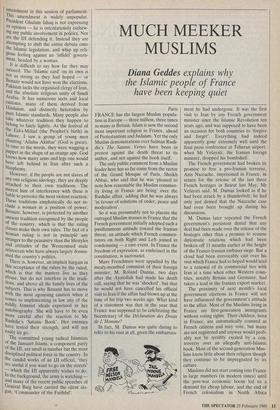MUCH MEEKER MUSLIMS
Diana Geddes explains why
the Islamic people of France have been keeping quiet
Paris FRANCE has the largest Muslim popula- tion in Europe — three million, three times as many as Britain. Islam is now the second most important religion in France, ahead of Protestantism and Judaism. Yet the only Muslim demonstrations over Salman Rush- die's The Satanic Verses have been in protest against the death threat to its author, and not against the book itself.
The only public comment from a Muslim leader here has so far come from the rector of the Grand Mosque of Paris, Sheikh Abbas, who said that he was 'pleased to note how reasonable the Muslim commun- ity living in France are being' over the Rushdie affair, adding that he was always 'in favour of solutions of order, peace and moderation'.
So it was presumably not to placate the outraged Muslim masses in France that the French government initially adopted such a pusillanimous attitude toward the Iranian threat, an attitude which French commen- tators on. both Right and Left joined in condemning — a rare event. In France the freedom of expression, as enshrined in the constitution, is sacrosanct.
Many Frenchmen were appalled by the mealy-mouthed comment of their foreign minister, M. Roland Dumas, two days after the Ayatollah had made his death call, saying that he was 'shocked', but that he would not have cancelled his official visit to Iran if the affair had blown up at the time of his trip two weeks ago. What kind of a statement was that in the year that France was supposed to be celebrating the bicentenary of the Declaration des Droits de L'Homme?
In fact, M. Dumas was quite daring to refer to his visit at all, given the embarrass- ment he had undergone. It was the first visit to Iran by any French government minister since the Islamic Revolution ten years ago, and was supposed to have been an occasion for both countries to 'forgive and forget'. Everything had indeed apparently gone extremely well until the final press conference at Teheran airport, when Mr Velayati, the Iranian foreign minister, dropped his bombshell.
The French government had broken its promise to free a pro-Iranian terrorist, Anis Naccache, imprisoned in France, in return for the release of the last three French hostages in Beirut last May, Mr Velayati said. M. Dumas looked as if he had been struck by a thunderbolt; he had only just denied that the Naccache case had even been brought up during his discussions.
M. Dumas later repeated the French government's persistent denial that any deal had been made over the release of the hostages other than a promise to resume diplomatic relations which had been broken off 11 months earlier at the height of the Franco-Iranian embassy siege. But a cloud had been irrevocably cast over his visit which France had so hoped would lead to a renewal of its commercial ties with Iran at a time when other Western coun- tries, notably Britain and Germany, had taken a lead in the Iranian export market.
The proximity of next month's local government elections in France will not have influenced the government's attitude to the affair. Most of the Muslims living in France are first-generation immigrants without voting rights. Their children, born in France, are automatically counted as French citizens and may vote, but many are not registered and anyway would prob- ably not be terribly excited by a con- troversy over an allegedly anti-Islamic book. Most of the second-generation Mus- lims know little about their religion though they continue to be impregnated by its culture.
Muslims did not start coming into France in large numbers (in modern times) until the post-war economic boom led to a demand for cheap labour, and the end of French colonialism in North Africa
















































 Previous page
Previous page